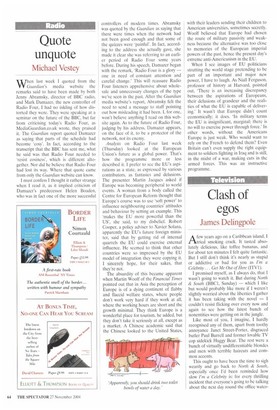Radio
Quote unquote
Michael Vestey
When last week I quoted from the Guardian's media website the remarks said to have been made by both Jenny Abramsky, director of BBC radio, and Mark Damazer, the new controller of Radio Four, I had no inkling of how distorted they were. They were speaking at a seminar on the future of the BBC, but far from criticising today's Radio Four, as MediaGuardian.co.uk wrote, they praised it. The Guardian report quoted Damazer as saying that parts of the schedule had become 'cosy'. In fact, according to the transcript that the BBC has sent me, what he said was that Radio Four needed to 'resist cosiness', which is different altogether. Nor did he believe that Radio Four had lost its way. Where that quote came from only the Guardian website can know.
I must confess I thought it rather strange when 1 read it, as it implied criticism of Damazer's predecessor Helen Boaden, who was in fact one of the more successful controllers of modern times. Abramsky was quoted by the Guardian as saying that there were times when the network had not been good enough and that some of the quizzes were 'painful'. In fact, according to the address she actually gave, she made it clear she was referring to an earlier period of Radio Four some years before. During his speech, Damazer began with the remark, 'Radio Four is a glory — one in need of constant attention and careful change.' This will reassure Radio Four listeners apprehensive about wholesale and unnecessary changes of the type we've seen in the past. After the Guardian media website's report, Abramsky felt the need to send a message to staff pointing out how misleading it had been. I, for one, won't believe anything I read on this website again. As to the future of Radio Four, judging by his address, Damazer appears, on the face of it, to be a protector of the network, not its enemy.
Analysis on Radio Four last week (Thursday) looked at the European Union's future as a global power. That's how the programme more or less described it, I prefer to see the EU's aspirations as a state, as expressed by various contributors, as fantasies and delusions. The presenter Martin Jacques asked if Europe was becoming peripheral to world events. A woman from a body called the Centre for European Reform thought that Europe's course was to use 'soft power' to influence neighbouring countries' attitudes and behaviour by setting an example. This 'makes the EU more powerful than the US', she said, to my disbelief. Robert Cooper, a policy adviser to Xavier Solana, apparently the EU's future foreign minister, said that by getting rid of internal quarrels the EU could exercise external influence. He seemed to think that other countries were so impressed by the EU model of integration they were copying it. I sincerely hope, for their sakes, that they're not.
The absurdity of this became apparent when Martin Woolf of the Financial Times pointed out that in Asia the perception of Europe is of a dying continent of flabby and flaccid welfare states, where people don't work very hard if they work at all, where the working hours are short and the growth minimal. They think Europe is a wonderful place for tourism, he added, but they don't take it seriously at all, except as a market. A Chinese academic said that the Chinese looked to the United States, with their leaders sending their children to American universities, sometimes secretly. Woolf believed that Europe had chosen the route of military passivity and weakness because the alternative was too close to memories of the European imperial powers of the past, hence the present day's extreme anti-Americanism in the EU.
When I see images of EU politicians strutting the world stage pretending to be part of an important and major new power, I have to laugh. As Niall Ferguson, professor of history at Harvard, pointed out, 'There is an increasing discrepancy between the aspirations of Europeans, their delusions of grandeur and the realities of what the EU is capable of delivering.' It wasn't that Europe didn't count economically; it does. 'In military terms the EU is insignificant, marginal; there is no will to exercise power through force.' In other words, without the Americans Europe is just weak. Who would want to rely on the French to defend them? Even Britain can't even supply the right equipment to soldiers fighting in Iraq and is still, in the midst of a war, making cuts in the armed forces. This was an instructive programme.


















































































 Previous page
Previous page